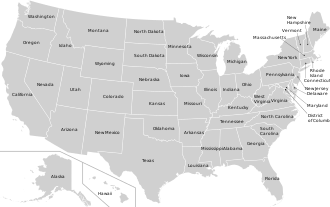This article needs additional citations for verification. (August 2014) |
| U.S. Fish and Wildlife Service Office of Law Enforcement | |
|---|---|
 Patch of the U.S. Fish and Wildlife Service | |
 U.S. Fish and Wildlife Service Special Agent Badge | |
 Flag of the U.S. Fish and Wildlife Service | |
| Agency overview | |
| Formed | 1900 |
| Jurisdictional structure | |
| Operations jurisdiction | United States |
 | |
| US FWS Jurisdiction throughout the United States. | |
| Size | 3,796,742 square miles (9,833,516.64 km2) |
| Population | 325,719,178 (2017) |
| Legal jurisdiction | United States |
| Governing body | U.S. Government |
| General nature | |
| Operational structure | |
| Headquarters | 5275 Leesburg Pike, Falls Church, Virginia |
| Special Agents | 261 [1] |
| Agency executive |
|
| Parent agency | United States Fish and Wildlife Service |
| Website | |
| Official website | |
The United States Fish and Wildlife Service Office of Law Enforcement contributes to Service efforts to manage ecosystems, save endangered species, conserve migratory birds, preserve wildlife habitat, restore fisheries, combat invasive species, and promote international wildlife conservation. It is an office of the United States Fish and Wildlife Service (FWS).
The Office of Law Enforcement focuses on potentially devastating threats to wildlife resource-illegal trade, unlawful commercial exploitation, habitat destruction, and environmental contaminants. The Office of Law Enforcement investigates wildlife crimes, regulates wildlife trade, helps Americans understand and obey wildlife protections laws, and works in partnership with international, state, and tribal counterparts to conserve wildlife resources. This work includes:
- Breaking up international and domestic smuggling rings that target imperiled animals.
- Preventing the unlawful commercial exploitation of protected U. S. species.
- Protecting wildlife from environmental hazards and safeguarding critical habitat for endangered species.
- Enforcing federal migratory game bird hunting regulations and working with states to protect other game species from illegal take and preserve legitimate hunting opportunities.
- Inspecting wildlife shipments to ensure compliance with laws and treaties and detect illegal trade.
- Working with international counterparts to combat illegal trafficking in protected species.
- Training other federal, state, tribal, and foreign law enforcement officers.
- Using forensic science to analyze evidence and solve wildlife crimes.
Distributing information and outreach materials to increase public understanding of wildlife conservation and promote compliance with wildlife protection laws.
- ^ Service, U.S. Fish and Wildlife. "Office of Law Enforcement - About Service Law Enforcement". www.fws.gov.
